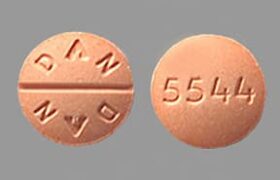5544 DAN DAN Pill – Allopurinol
Medically Reviewed by AJAY AWASE | Written by Ajay, PharmD, IGNTU
tablet bearing the number 5544 DAN DAN Pill – Allopurinol is an orange, round substance that has been identified as 300 mg of allopurinol. Watson Laboratories, Inc. provides it.
Allopurinol is a member of the anti-gout and anti-hyperuricemic medication families and is used to treat gout, calcium oxalate calculi with hyperuricosuria, and hyperuricemia secondary to chemotherapy. Pregnancy cannot be considered risk-free. The prohibited Substances Act (CSA) does not classify 300 mg of allopurinol as a prohibited substance.
Here’s a table format with color suggestions for the information you provided about Amitriptyline. You can use HTML or any word processor to create a visually appealing table.
| Attribute | Details |
|---|---|
| Availability | Prescription only |
| Drug Class | Antigout agents, Antihyperuricemic agents |
| Pregnancy Category | C – Risk cannot be ruled out |
| CSA Schedule | Not a controlled drug |
| Labeler / Supplier | Watson Laboratories, Inc. |
5544 DAN DAN Pill – Allopurinol

Introduction
What is Allopurinol?
Allopurinol is a drug that is frequently administered to treat excessive blood uric acid levels, especially in gout and kidney stone sufferers. Those suffering from uric acid-related disorders have viable therapy choices with the 100 mg of Allopurinol included in the pill labeled 5544 DAN DAN.
Overview of the 5544 DAN DAN Pill
The 5544 DAN DAN pillis a very identifiable circular white tablet. It is essential to the treatment of gout and helps to a great extent to avoid excruciating flare-ups.
Uses of Allopurinol
Managing Gout: How Allopurinol Works
Allopurinol functions by blocking the xanthine oxidase enzyme, which is necessary for the synthesis of uric acid. Allopurinol aids in preventing the development of urate crystals, which are responsible for the excruciating inflammation linked to gout, by lowering uric acid levels.
Preventing Kidney Stones
Allopurinol not only treats gout but also effectively prevents kidney stones of a certain kind, especially uric acid-based ones. Maintaining normal uric acid levels lowers the chance of stone development.
Other Off-Label Uses
Allopurinol may also be recommended for other ailments, such as specific enzyme shortages and hyperuricemia brought on by cancer treatment. For individualized guidance, always seek the opinion of a healthcare specialist.
Benefits of Allopurinol
Reducing Uric Acid Levels
The main advantage of allopurinol is its capacity to dramatically reduce blood uric acid levels, which aids in gout attack prevention and excellent symptom management.
Long-Term Health Benefits
Allopurinol lowers the risk of persistent high uric acid-related long-term consequences, including renal disease and joint damage, by regulating uric acid levels.
Improving Quality of Life for Gout Sufferers
By lessening the frequency and intensity of attacks, Allopurinol used regularly can help people with gout live better overall lives by enabling them to carry out daily activities without worrying about excruciating pain.
How to Take Allopurinol
Recommended Dosage Guidelines
Allopurinol is commonly started at a modest dose, usually 100 mg daily, and may be progressively increased following uric acid levels and therapeutic response. It’s critical to adhere to the dose recommendations made by your healthcare practitioner.
Timing and Administration Tips
Allopurinol ought to be taken postmeal in order to reduce stomach discomfort. For best results, it should be taken consistently at the same time every day.
Importance of Staying Hydrated
It’s important to drink enough of water when taking allopurinol. Consuming enough fluids promotes healthy kidney function and reduces the risk of kidney stones.
Potential Side Effects
Common Side Effects of Allopurinol
While Allopurinol is generally well-tolerated, some common side effects include:
- Skin rash
- Drowsiness
- Nausea
- Diarrhea
Serious Side Effects to Watch For
Although rare, serious adverse effects are possible. These could involve serious liver problems or skin rashes. Seek medical assistance if you encounter any strange symptoms.
How to Manage Side Effects
See your doctor for advice if you experience minor side effects. Additional medicine or dose adjustments may help reduce discomfort.
Drug Interactions
Medications to Avoid
Allopurinol and several drugs may interact, raising the possibility of negative effects or decreasing the drug’s effectiveness. Never withhold information about any prescriptions you take from your healthcare physician, including over-the-counter medications and vitamins.
Safe Combinations with Allopurinol
In order to successfully manage illnesses while reducing risks, your doctor might offer advice on safe medication combinations.
Lifestyle Considerations
Dietary Tips for Gout Management
Incorporating a low-purine diet can enhance the effectiveness of Allopurinol. Focus on consuming:
- Fruits and vegetables
- Whole grains
- Low-fat dairy products
Importance of Regular Check-Ups
Regular follow-ups with your healthcare provider are essential to monitor uric acid levels and adjust treatment as necessary. This proactive approach helps ensure optimal management of your condition.
Conclusion
Key Takeaways on Allopurinol
Allopurinol is a valuable medication for managing gout and preventing kidney stones. Understanding its uses, benefits, and potential side effects is crucial for effective treatment.
When to Consult a Healthcare Provider
If you have side effects from your medicine, have questions about your treatment plan, or have concerns about your drug, always consult a healthcare provider. Allopurinol has the potential to greatly enhance your quality of life when used appropriately.
FAQ: Allopurinol and the 5544 DAN DAN Pill
1. What is Allopurinol?
Allopurinol is a drug that is mostly used to reduce blood uric acid levels, which helps control some kinds of kidney stones and avoid gout attacks.
2. What does the 5544 DAN DAN pill contain?
The 5544 DAN DAN pill is a white, round tablet that contains 100 mg of Allopurinol.
3. How does Allopurinol work?
Allopurinol functions by blocking the xanthine oxidase enzyme, which lowers the body’s uric acid synthesis and stops urate crystals from forming, the cause of gout.
4. What are the common uses of Allopurinol?
Allopurinol is primarily used for:
- Managing gout
- Preventing kidney stones
- Treating hyperuricemia associated with certain cancers
5. What are the potential side effects of Allopurinol?
Common side effects include:
- Skin rash
- Drowsiness
- Nausea
- Diarrhea
Serious side effects can include severe allergic reactions or liver issues.
6. How should I take Allopurinol?
Allopurinol is often taken orally following a meal. It’s crucial to take the medication consistently at the same time every day and to adhere to your doctor’s dosing guidelines.
7. Can I drink alcohol while taking Allopurinol?
While using Allopurinol, it is advisable to avoid alcohol as much as possible as it can raise uric acid levels and possibly cause gout attacks.
8. Are there any drug interactions with Allopurinol?
Yes, drugs, including mercaptopurine and azathioprine, may interact with allopurinol. Never withhold information about any medications you are taking from your healthcare professional.
9. How long does it take for Allopurinol to work?
The entire uric acid reduction and gout attack prevention effects of allopurinol may not become apparent for a few weeks.
10. When should I consult my doctor about Allopurinol?
If you have serious side effects, questions about your treatment strategy, or if your symptoms don’t get better, speak with your doctor.
Here are some references you can use for information about Allopurinol and the 5544 DAN DAN pill:
U.S. National Library of Medicine: MedlinePlus. Allopurinol Information.
PubMed Health: Allopurinol Overview and Pharmacology.


